Cost of living: 'I don't want a funeral, it's a waste of money'
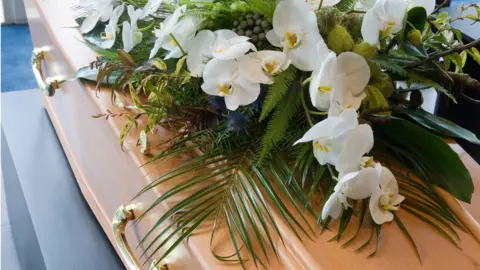 Getty Images
Getty ImagesDirect cremations, when the body is cremated without a service and the ashes are returned to the family, have risen in popularity in the last few years, partly because they are the cheapest option.
Janet Jones, 70, of Attleborough, Norfolk, is considering whether to book one for herself and her husband, as she wants to make sure her two children can benefit from whatever money they have left.
Janet worked for 30 years in a GP surgery and her husband Chris, who she has been married to for 50 years, worked for 33 years in a factory.
"We've worked all our lives and we want our children to have that money to do something to remember us in their own way," she says.
Janet would like her family to go on holiday instead and have a drink to celebrate their lives.
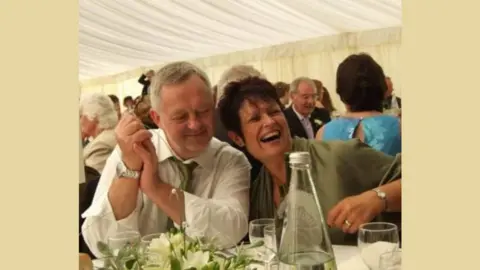 Janet Jones
Janet JonesBut Janet's daughter, Bridie, isn't sure it's the right option.
"Because of their age I thought they would go down a traditional route. There are so many people who love them who want to say goodbye properly," she says.
"They are so selfless and they don't want us to be burdened with massive funeral costs. It's what they want and I have to respect that and accept it. I just need to get my head around it," she adds.
Direct cremations grew in popularity during the coronavirus outbreak, but the trend shows no signs of slowing. Funeral directors say there has been an increase in demand for basic services due to the cost of living crisis.
Average funeral costs were £3,953 last year, compared to an average cost of £1,511 for direct cremations, which now account for 18% of all funerals, according to a report from insurer SunLife.
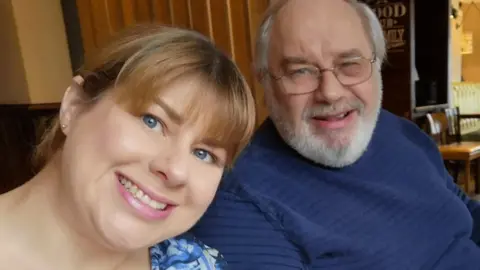 Isobel Monaghan
Isobel MonaghanDonald Pearce, who was 72, died suddenly at his daughter's home on Christmas Day in 2019, and left very clear instructions in his will that he wanted a direct cremation and no funeral service.
His daughter, Isobel, who lives in Kingswinford in the West Midlands, says it didn't come as a surprise because they had already discussed it and she was grateful to have such clear guidance from him.
"It felt like the right decision," she says. "He lived a quiet life towards the end and he was mindful of money, he wanted it to all go to his children."
The family didn't know when he would be cremated - the firm sent them a card afterwards saying the date it had taken place and where his ashes had been scattered. They weren't able to go and see his body, but Isobel says this didn't matter to them.
They booked a room at a registry office and had a "very positive celebration of his life". Isobel and her sister both did a reading and played his favourite song - New Horizons by The Moody Blues. It cost £1,500 in total for the direct cremation, including a meal for everyone.
"It was immediate family only, it felt more appropriate for the children than a funeral would have done. It was lovely, intimate and true to his wishes, but also met our need to say goodbye," she says.
"It couldn't have been a more perfect send-off, and we've all agreed we want something similar when our time comes too."
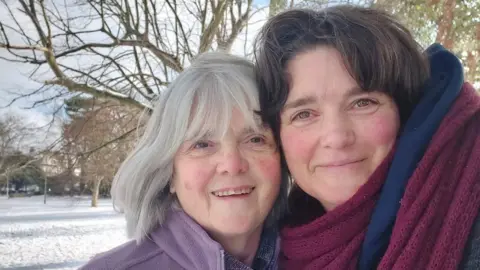 Cindy Eve
Cindy EveCindy Eve, 68, from Ramsgate, Kent, has booked and paid for a direct cremation as she couldn't stand the thought of her daughter grieving for her in an empty church or crematorium.
"Most of my family live in South Africa, where I'm from," she says. "My mother died when I was young and the funeral was very traumatic. I don't want my daughter to go through that."
Her daughter Cémanthe is comfortable with the plan, she adds, and Cindy has told her wider family so they understand her wishes in advance.
"Funerals are so expensive. I'd rather my daughter puts that money towards a house or a new car. I don't want a big fuss and it would be such a waste of money."
Some online companies advertise direct cremations from just £995. For that price, the firm will collect the body from the hospital, for example, take it away for cremation and return the ashes.
When Esther O'Brien, who lives in Devon, found out her terminally ill father David O'Brien had booked one, she begged him to cancel it.
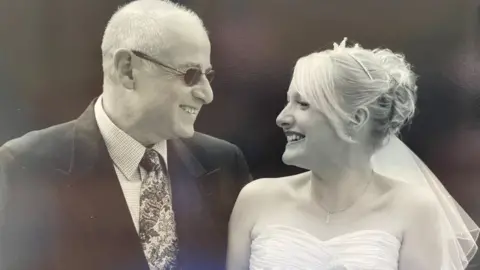 Esther O'Brien
Esther O'BrienAfter being diagnosed with leukaemia, he decided he didn't want his family to have the burden of arranging a funeral.
"I cried my eyes out. I couldn't bear the thought of him being taken off and receiving his ashes in the post two weeks later.
"He hadn't looked into all the details, he just didn't want to cause any bother. When I told him that I'd really like him to have a funeral, he was extremely touched and felt valued and loved.
"He pointed out to me that the extra cost was coming out of any money he was leaving, but that didn't matter to me."
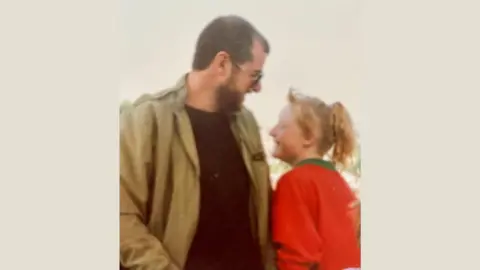 Esther O'Brien
Esther O'BrienDavid cancelled the direct cremation and died a week later, aged 74, in April last year. The family were able to hold a regular funeral for him, which cost about £4,500.
"He had married his partner of 26 years a few years earlier. At her funeral he wore his wedding outfit and when he died we were able to have the funeral home dress him in those clothes to go off in. That was really important for us," Esther adds.
"The funeral isn't actually for the person who died, but for loved ones left behind as part of the process. It meant we could say goodbye properly."
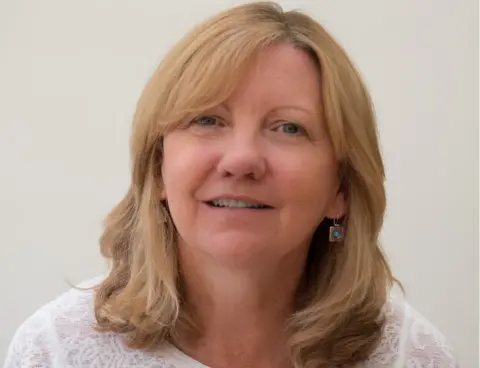 Frances Alcock
Frances AlcockFuneral director Frances Alcock, who owns Opals Funerals in Hedgerley, Buckinghamshire, worries that more companies are starting up without much experience of funerals.
"My biggest concern is the lack of support for the family members who are trying to grieve. It worries me that there might be unresolved grief with these direct cremations bought online," the former nurse says.
"It's really important that people understand what direct cremations involve - you do not get a chance to say goodbye unless you sort out your own service.
"I get phone calls because they are national firms looking to outsource parts of the business, like collecting the bodies from hospital, and they are often transported across the country."
But she agrees that, done in the right way, direct cremations can work for some families.
"I had two daughters choose a direct cremation with me for their mum, but they still said goodbye in their own way. They sat with the coffin and brought flowers and went for a family meal, and that was right for them.
"If people can't afford a full funeral, I will suggest ways to make it cheaper like having a small funeral, not having pallbearers and different coffin options.
"The family can lead the service if they like and take early slots at the crematorium. It just means they can still have a service that suits them, with personal touches like making sure they are dressed in special clothes," she adds.
"The main thing is to discuss it as a family and work out what is best. It is so important to get it right, for the sake of the person who has died and for the family left behind."

Find BBC News: East of England on Facebook, Instagram and Twitter. If you have a story suggestion email [email protected]
